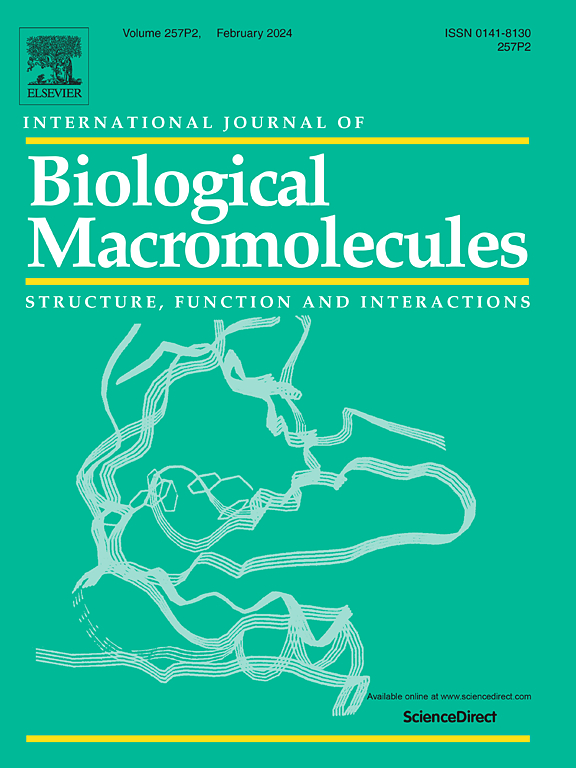Zein-based nanostructured coatings: A green approach to enhance virucidal efficacy of protective face masks
IF 7.7
1区 化学
Q1 BIOCHEMISTRY & MOLECULAR BIOLOGY
International Journal of Biological Macromolecules
Pub Date : 2025-02-01
DOI:10.1016/j.ijbiomac.2024.138830
引用次数: 0
Abstract
Face masks represent a valuable tool to prevent the spreading of airborne viruses; however, they show poor comfort and scarce antiviral efficacy. Zein-based coatings are herein exploited to enhance antiviral performance. Zein functionalization is done through acidifying agents (lactic acid, LA). Coatings are characterized in terms of morphological, mechanical, breathability, and cytotoxicity analyses. The antiviral efficacy is tested in vitro against four viruses (Human Coronavirus OC43, Herpes Simplex Virus type 1, Human Adenovirus type 5, and MPox Virus) according to a biological assay on cell cultures. Zein/Zein LA antiviral activity seems to be linked to its positive surface charge that enables to form electrostatic interactions with negatively charged-viruses, resulting in the highest activity (reduction >2 Log) on Human Coronavirus OC43 and Herpes Simplex Virus type 1, with efficacy comparable or higher than that of copper/copper oxide-based- coatings. No significant activity is observed against Human Adenovirus type 5 and MPox Virus, due to their high resistance to inactivating treatments. Zein-based systems are not cytotoxic and their water vapor permeability is reduced of 26 % compared to that of not-coated systems. These promising results offer interesting insights into design of antiviral and sustainable coatings for personal protective equipment.

基于玉米蛋白的纳米结构涂层:一种提高防护口罩杀毒效果的绿色途径。
口罩是防止空气传播病毒的宝贵工具;然而,它们显示出较差的舒适性和抗病毒功效。本文利用玉米蛋白基涂层来增强抗病毒性能。玉米蛋白功能化是通过酸化剂(乳酸,LA)完成的。涂层在形态、机械、透气性和细胞毒性分析方面具有特征。根据细胞培养的生物测定,在体外对四种病毒(人类冠状病毒OC43、单纯疱疹病毒1型、人类腺病毒5型和m痘病毒)的抗病毒功效进行了测试。玉米蛋白/玉米蛋白LA的抗病毒活性似乎与其表面带正电荷有关,这使得它能够与带负电荷的病毒形成静电相互作用,从而在人类冠状病毒OC43和1型单纯疱疹病毒上具有最高的活性(还原bbbb2 Log),其功效与铜/氧化铜基涂层相当或更高。由于人类腺病毒5型和MPox病毒对灭活处理的高抗性,未观察到明显的活性。以玉米蛋白为基础的系统没有细胞毒性,与未涂覆的系统相比,其水蒸气渗透率降低了26% %。这些有希望的结果为设计用于个人防护装备的抗病毒和可持续涂层提供了有趣的见解。
本文章由计算机程序翻译,如有差异,请以英文原文为准。
求助全文
约1分钟内获得全文
求助全文
来源期刊
CiteScore
13.70
自引率
9.80%
发文量
2728
审稿时长
64 days
期刊介绍:
The International Journal of Biological Macromolecules is a well-established international journal dedicated to research on the chemical and biological aspects of natural macromolecules. Focusing on proteins, macromolecular carbohydrates, glycoproteins, proteoglycans, lignins, biological poly-acids, and nucleic acids, the journal presents the latest findings in molecular structure, properties, biological activities, interactions, modifications, and functional properties. Papers must offer new and novel insights, encompassing related model systems, structural conformational studies, theoretical developments, and analytical techniques. Each paper is required to primarily focus on at least one named biological macromolecule, reflected in the title, abstract, and text.

 求助内容:
求助内容: 应助结果提醒方式:
应助结果提醒方式:


